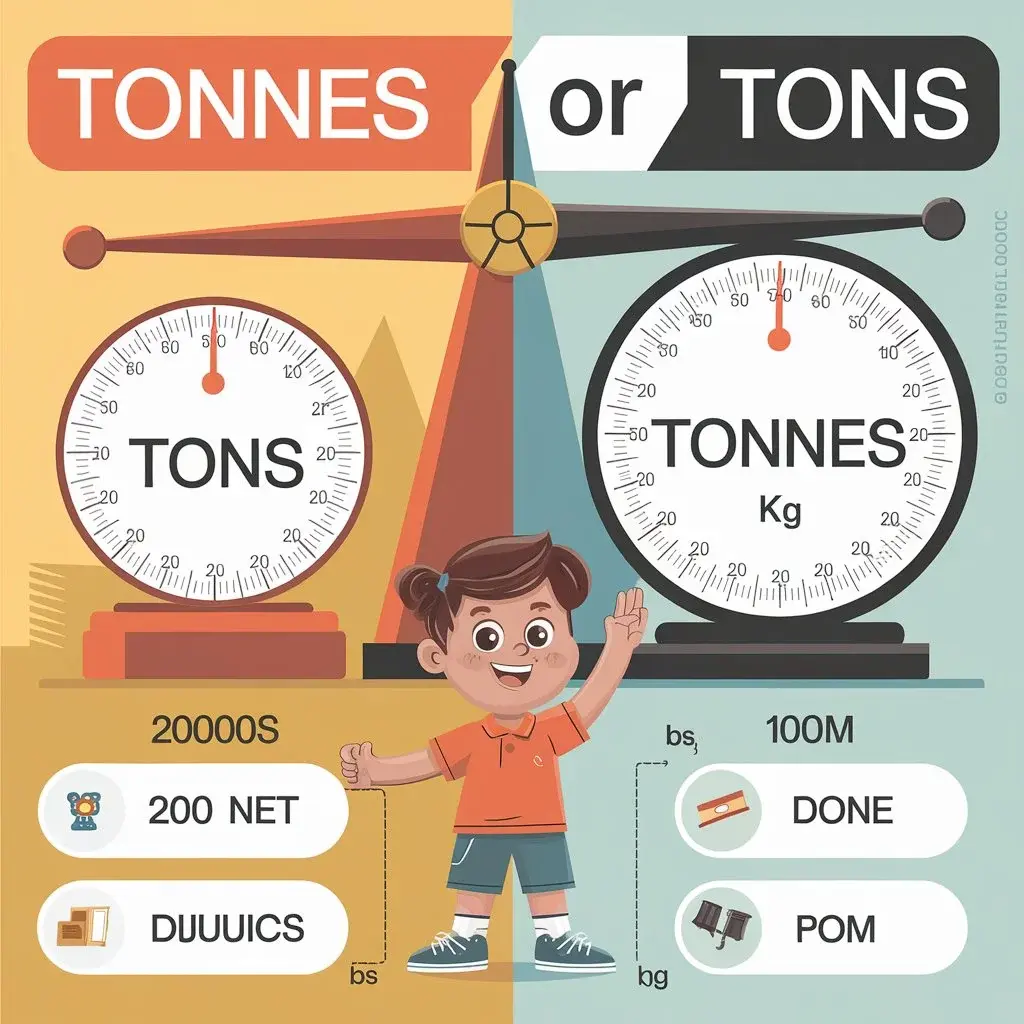Understanding the difference between “tons” and “tonnes” can be confusing, especially when learning English or dealing with different measurement systems. In American English, a ton refers to a unit of weight equal to 2,000 pounds (lbs), while in British English, the word tonne refers to the metric ton, which is 1,000 kilograms (kg).
These two units may sound similar, but they represent different systems of measurement. The plural forms, “tons” and “tonnes”, are used to indicate more than one unit in their respective systems. If you’re working outside the US, it’s more common to encounter “tonnes” due to the widespread use of the metric system. Knowing when to use tons or tonnes is important, depending on the context and region.
Is It “Tonnes” or “Tons”?
The plural of “ton” in American English is “tons,” and this is the only acceptable form when referring to multiple tons. In the United States, a ton is a unit of measurement equivalent to 2,000 pounds (lbs). However, this doesn’t mean that “tonnes” is incorrect—it’s just a different unit of measurement.
A “tonne” is not the same as a “ton.” A tonne refers to a metric ton, which is a different standard of measurement entirely.
How Are “Tons” and “Tonnes” Used in American and British English?
In American English, “ton” is a commonly used measurement, representing 2,000 lbs. However, in British English, the ton is not used because the UK adheres to the metric system. Instead, the British use the word “tonne,” which represents a metric ton and is equal to 1,000 kilograms (kg). This makes the tonne heavier than the American ton, which is important to remember.
Despite the difference in measurement, both systems follow the same rule when it comes to the plural form. Simply add an “s” to indicate more than one tonne or ton.
For example:
- Tons (plural in American English) refer to multiple 2,000-lb units.
- Tonnes (plural in British English) refer to multiple 1,000-kg units.
- Tons (plural in American English) refer to multiple 2,000-lb units.
- Tonnes (plural in British English) refer to multiple 1,000-kg units.
- In American English, a ton equals 2,000 pounds.
- In British English, a tonne equals 1,000 kilograms.
- The ton is part of the imperial system of measurement.
- The tonne is part of the metric system used globally.
- A tonne is heavier than an American ton by about 200 pounds.
- American English speakers use tons for heavy objects like freight and vehicles.
- In the UK, heavy items are measured in tonnes.
- The plural of ton is always tons in American English.
- The plural of tonne is always tonnes in British English.
- If you’re working in the US, you’ll mostly encounter tons.
- Outside the US, you’re more likely to see tonnes.
- Tons are used to measure large items like machinery and cargo.
- Tonnes are used for similar purposes but follow the metric system.
- A ton is equal to 2,000 lbs, a standard in American measurements.
- A tonne equals 1,000 kg, commonly used in European countries.
- The metric ton (tonne) is preferred in most parts of the world.
- In the United States, tons are used for domestic trade and shipping.
- For international trade, tonnes are often the standard.
- Understanding the difference between tons and tonnes is crucial in global trade.
- The UK adopted the tonne after transitioning to the metric system.
- Canada also uses the metric system, so tonnes are more common there.
- When measuring something large, it’s important to know whether to use tons or tonnes.
- Tons and tonnes are not interchangeable due to the different systems of measurement.
- If you’re calculating large shipments, use tons for American-based calculations.
- Use tonnes for measurements in metric-system countries.
- A ton equals about 907 kg, while a tonne equals exactly 1,000 kg.
- If you deal with both American and British measurements, you’ll need to know both tons and tonnes.
- Remember that tons are part of the imperial system and tonnes are part of the metric system.
Outside of the United States, most countries are more familiar with the British English term “tonne”, as they follow the metric system.
What Should You Use if You’re Not From the US or UK?
If you’re from a non-English-speaking country that follows the metric system, it’s more common to use “tonnes.” Unless you have direct business dealings with the United States, where the imperial system (which uses tons) is still in place, you’ll likely find that “tonne” is the most appropriate term to use.
However, personal preference and familiarity with either the imperial or metric systems can influence your choice. If you’re more accustomed to measuring weight in pounds, the American ton might feel more intuitive. On the other hand, if you prefer using kilograms, then the British tonne will make more sense.
What Do “Tons” and “Tonnes” Actually Mean?
In American English, “tons” refers to the plural form of ton, with each ton equaling 2,000 lbs. This term is often used to weigh heavy items, like freight, vehicles, or even large animals like elephants.
In British English, “tonnes” refer to the plural form of metric ton. Each tonne equals 1,000 kg, which is approximately 2,200 lbs. As a result, a tonne is slightly heavier than an American ton.
Both terms are used to measure very heavy items, but the key difference lies in the system of measurement—imperial vs. metric.
Tips for Remembering the Correct Spelling of “Tonnes” vs. “Tons”
Now that you know the difference between tons and tonnes, let’s focus on how to remember when to use each. One simple trick is to remember that the “tonne” is heavier, and it’s also the longer word by two letters. The extra letters can remind you that a tonne weighs more than a ton.
Another memory aid involves a bit of geography. The word “tonne” ends with the letters “NE,” and Great Britain is located northeast of the United States. This can help you remember that “tonne” is used in British English, while “ton” is the term used in American English.
With these tips, you’ll be able to confidently use “ton” in American English and “tonne” in British English when discussing measurements of heavy weight. Even if you never need to use these units of measurement, it’s a handy distinction to know.
FAQs
What is the difference between tons and tonnes?
Tons are used primarily in American English and represent a unit of 2,000 pounds (lbs), which is part of the imperial system. In contrast, tonnes are used in British English and refer to a unit of 1,000 kilograms (kg), belonging to the metric system. Although the two words sound similar, they are used in different regions and are not interchangeable due to their differing weights.
How much does one ton weigh?
In American English, one ton weighs exactly 2,000 pounds. This unit is used for heavy loads, such as large vehicles, construction materials, or cargo. The imperial system is predominantly used in the United States, so the ton is the standard there.
How much does one tonne weigh?
A tonne weighs exactly 1,000 kilograms, which is approximately 2,204 pounds. This unit of measurement is part of the metric system, commonly used in countries such as the UK, Europe, Canada, and most of the world, except for the US. The tonne is often used in international trade and industry for weighing large quantities or freight.
Where should I use tons vs. tonnes?
Use tons when dealing with American measurements or working with countries like the United States that use the imperial system. In contrast, use tonnes when interacting with countries that follow the metric system, such as the UK, Europe, and Australia. Knowing the correct usage is important for trade and commerce to avoid confusion and mistakes in weight calculations.
Is a tonne heavier than a ton?
Yes, a tonne is heavier than a ton. A tonne weighs 1,000 kilograms, which is equivalent to approximately 2,204 pounds. In comparison, a ton weighs only 2,000 pounds, making a tonne about 10% heavier than a ton. This distinction becomes important when measuring large loads or calculating shipping costs.
Can I use tons and tonnes interchangeably?
No, you cannot use tons and tonnes interchangeably, as they belong to different measurement systems. A ton is part of the imperial system and is used in the US, while a tonne is part of the metric system and used globally in countries that do not follow the imperial system. Mixing them up can result in significant measurement errors.
Do tons exist in the metric system?
No, tons do not exist in the metric system. The metric system uses tonnes, which are standardized at 1,000 kilograms. The metric system is widely adopted globally, whereas the imperial system, which uses tons, is primarily used in the United States and a few other countries.
Should I use tonnes if I’m not from the US or UK?
Yes, if you’re from a non-English speaking country that follows the metric system, you should use tonnes. Most of the world operates with metric measurements, so tonnes will be the more common and familiar unit. You might only need to use tons if you’re dealing directly with American businesses or US commerce that still uses the imperial system.
Conclusion
In summary, tons and tonnes may sound similar but represent different systems of measurement depending on whether you’re using American or British English. Always remember that a ton is an American measurement equal to 2,000 lbs, while a tonne is a metric unit equal to 1,000 kg (or roughly 2,200 lbs).

I’m Mira Sinclair, the expert helping you navigate grammar sections at “Grammer Grove.” Playing with words and expressions is my thing. At Grammer Grove, we’re here to make yourwriting stand out and shine. Let’s make your appreciation heartfelt and memorable—come and join the fun at Grammer Grove!












